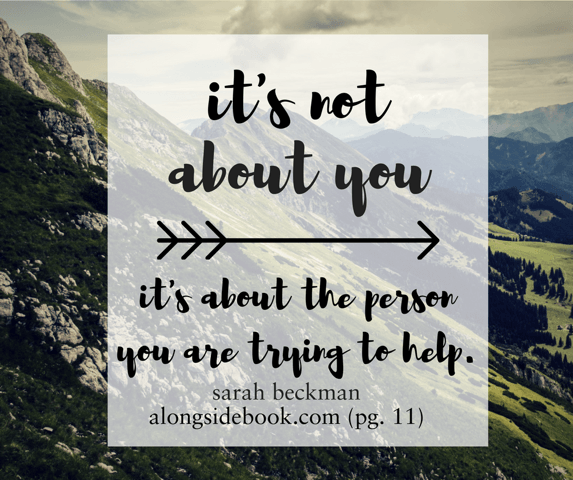If you’re like me, you’ve heard the horror stories about people who face serious life-altering situations—like cancer, long-term illness, loss of a child, death of a loved one—and someone made their hardship worse by saying or doing the wrong thing. It almost seems it’s the exception instead of the rule. So why when we want to help a friend who’s already facing great hardship do we tend to compound the wound instead of applying salve to it?
One simple reason.
We forget that it’s not about us.


We forget that our feelings are secondary in light of the intense pain and hardship that person is facing. We forget that our job is to comfort, not assert our agenda. We forget the Biblical principle of putting others’ needs above our own.
So here’s what you need to know: It’s not about you. It’s about the person you’re trying to help.
So how do we help our friend instead of focus on our own issues, agenda, needs, or feelings?
Put their feelings ahead of yours.
If you have lots of your own grief, be sure you process that before trying to “be there” for someone else. It’s usually not helpful to let your anguish spill over on the person who’s hurting. Or if you’re someone who likes to be in the know, keep your need to have the scoop in check. It’s not about you having the inside information right now. And if you feel unappreciated, please, oh please, realize that this is not the time to be fishing for compliments, gratitude or approval.
Give lots of grace.
Crisis can make people irrational. So be the rational one in the equation, and take things in stride. Forgiveness and understanding are in order, not judgment and keeping a tally of wrongs. When in doubt, offer grace. And if you need reminding, grace can be defined as undeserved forgiveness. And unconditional love should be the daily special.
Temper your enthusiasm.
When someone is newly diagnosed maybe all you want to do is be with them, expressing your concern or care. But these are tender times, and your job is to tread lightly. Ask for permission to visit, and then by all means, don’t stay for 3 hours! If someone has lost a loved one, you might ask if they want company, and then again, don’t overstay your welcome. If there are pressing demands on the person or family, don’t distract them from the tasks at hand by inserting your overzealous desire to help. The best thing you can do is be in tune to their cues, or even ask directly “I think I’ll be going now, unless you still need my help or company?”
Remembering those four simple words, “It’s not about you” will take you far as you reach out to love a friend in need.

